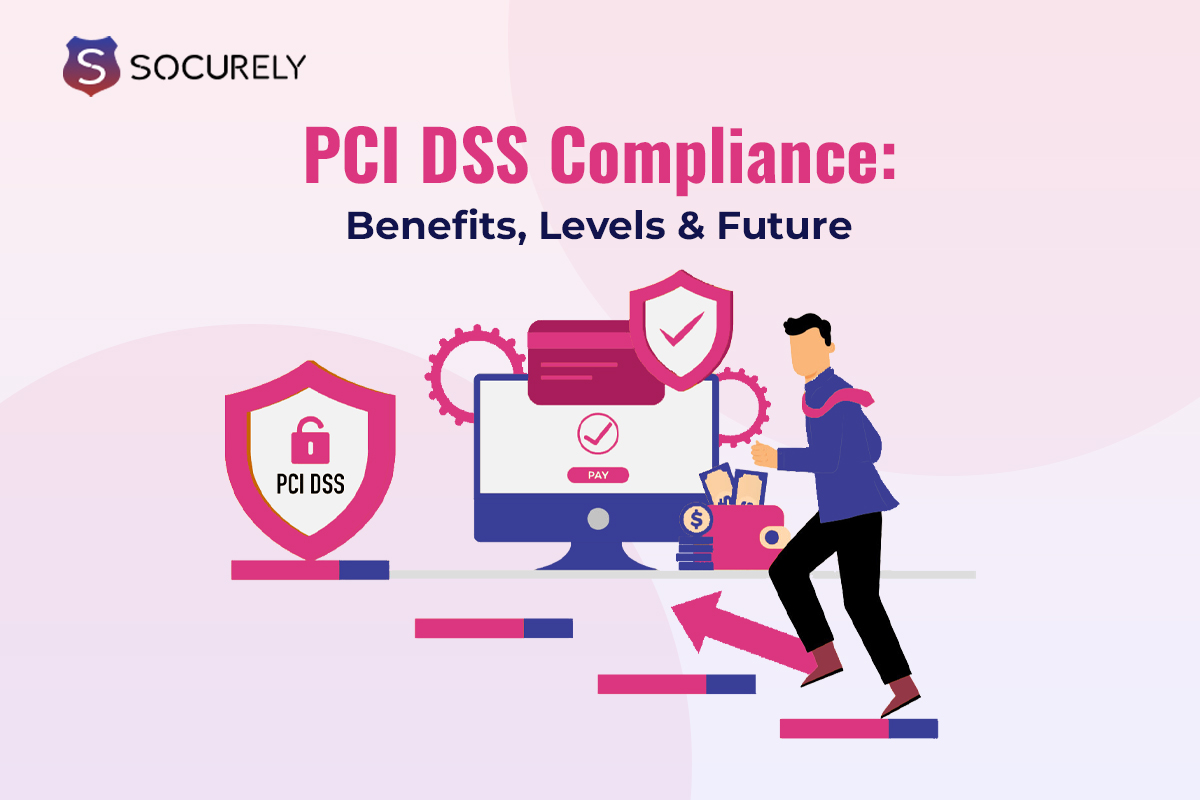Being a part of a digital-driven era where digital transactions reign supreme, safeguarding sensitive cardholder information is a big challenge indeed. Enter the realm of PCI DSS Compliance – the guardian of secure credit card transactions. In this insightful blog, we delve into the intricacies of PCI DSS Compliance, exploring its levels, benefits, and why it’s crucial for businesses of all sizes.
Benefits of PCI DSS Compliance
- Fortification Against Data Breaches: In the contemporary landscape where data breaches affect businesses of all sizes, PCI-DSS emerges as the stalwart defender. Its rigorous requirements act as a shield, ensuring that the necessary safeguards are in place to thwart large-scale breaches. The prevention of data breaches becomes a primary objective, safeguarding both the organization and its clientele.
- Elevation of Customer Trust: In a world teeming with digital transactions, the security of credit card data is paramount. PCI DSS compliance goes beyond the technicalities, becoming a beacon of assurance for consumers. Amidst rising awareness due to publicized breaches, PCI compliance has become a symbol of best practices.
Customer trust, a cornerstone of brand integrity and profitability, flourishes when clients are confident that their data is safeguarded. Startlingly, studies reveal that two-thirds of US adults refrain from returning to businesses post a data breach, underscoring the pivotal role of trust in consumer relationships.
- Mitigation of Financial Penalties: The financial ramifications of non-compliance are a considerable concern. PCI DSS ensures that businesses avoid the quagmire of fines and penalties. While contrasting with GDPR’s one-time fines, PCI DSS penalties accumulate monthly, until compliance is achieved. It not only poses a financial burden but also underscores the importance of timely compliance. The process might be expensive, but the cost of non-compliance is a weighty consideration.
- Propel Your Business Trajectory: In the eyes of cybercriminals, third-party networks serve as potential gateways. Businesses, recognizing this vulnerability, now scrutinize the security measures of vendors and partners rigorously. PCI compliance becomes a powerful asset, enhancing the prospects of forming robust business relationships.
The tenfold increase in chances for partnership attests to the growing recognition of PCI compliance as a prerequisite for secure collaborations. It’s not merely a checkbox; it’s a strategic advantage in the competitive landscape.
PCI DSS Compliance Levels
Understanding the diverse compliance levels matters for businesses aiming to fortify their cybersecurity posture. Let’s demystify the tiers:
- Compliance Level 1 (Transactions per year > 6 million): The pinnacle, where a PCI-qualified security assessor (QSA) conducts an audit to ensure adherence to stringent standards. An annual Report on Compliance (ROC) becomes an integral part of the process.
- Compliance Level 2 (Transactions per year – 1 million to 6 million): Businesses falling within this bracket undergo Self-Assessment Questionnaires (SAQs) to attest compliance with the PCI Data Security Standard. A vital step towards securing transactions.
- Compliance Level 3 (Transactions per year – 20,000 to 1 million): Similar to Level 2, organizations in this category complete SAQs, reinforcing their commitment to maintaining robust security practices.
- Compliance Level 4 (Transactions per year < 20,000): While not mandatory, filling out SAQs is recommended for businesses at this level. A proactive step towards securing transactions and building customer trust.
What Lies Ahead?
Navigating the complex landscape of safeguarding cardholder data stands as an omnipresent challenge for businesses immersed in credit card transactions. Embracing the robust foundation laid by PCI standards is not just a strategic choice; it’s a crucial step forward. The repercussions of sidestepping or approaching PCI DSS half-heartedly are pitfalls that no business can afford.
Wrapping Up
In the ever-evolving landscape of cyber threats, PCI DSS Compliance emerges as the linchpin for businesses. The investment in securing transactions pays dividends in customer trust, brand integrity, and financial stability. Whether a giant in the market or a burgeoning startup, adherence to PCI DSS standards is not just a legal obligation but a strategic move to fortify the foundation of any enterprise.
FAQs
Why is PCI DSS Compliance crucial for businesses?
PCI DSS Compliance is imperative for businesses as it ensures the secure handling of credit card transactions, protecting both the organization and its customers from data breaches and fraud.
How often does PCI DSS Certification need to be renewed?
It is an annual requirement, necessitating businesses to validate their compliance annually to ensure continuous adherence to security standards.
What are the potential costs of non-compliance with PCI DSS?
Non-compliance can result in hefty financial penalties and damage to the reputation of the business. The aftermath of a data breach can be far more expensive than the investment in PCI DSS Compliance.
How long does the PCI DSS Certification process take?
The duration varies, typically taking one to two weeks. Factors influencing the timeline include the complexity of payment processes and the existing state of information security.
How can I ensure the security of payment systems or account data?
Ensuring the security of payment systems or account data is a shared responsibility among businesses engaged in payment processing. Adopting industry-wide security standards, endorsed by the PCI Security Standards Council, eradicates conflicting brand-specific requirements. This streamlined approach simplifies compliance for businesses storing payment account data, fostering a more secure payment processing environment.
Is vulnerability scanning necessary for compliance validation?
Certainly, if your business stores cardholder data post authorization or if your processing systems maintain internet connectivity, a quarterly scan conducted by a PCI SSC Approved Scanning Vendor (ASV) is mandatory. This proactive measure is pivotal in identifying and addressing potential vulnerabilities and ensuring ongoing compliance and data security.
How does PCI DSS approach penetration testing, and who performs it?
In the realm of PCI DSS compliance, penetration testing serves as a more rigorous evaluation compared to vulnerability assessment. While vulnerability assessment pinpoints and reports vulnerabilities, penetration testing goes a step further, attempting to exploit these vulnerabilities to gauge the possibility of unauthorized access or malicious activities.
This comprehensive testing includes network and application layer assessments, as well as an examination of controls and processes surrounding networks and applications.
Importantly, the PCI DSS compliance does not mandate that a Qualified Security Assessor (QSA) or ASV exclusively performs penetration testing. It grants flexibility, allowing the testing to be carried out by either a qualified internal resource or a third-party professional, emphasizing the importance of thorough security evaluations.







